

.jpg)
.jpg)
Keynote Speaker
Digitalisation is challenging cherished habits: Why do we have cities when everyone has a smartphone? How do companies function without people? Is the future still being shaped or already programmed? Every week, Christoph
Holz discusses exciting future topics with well-known personalities from IT, business & co and asks about the sense and nonsense
behind digitalisation. In the stories of the day after tomorrow, modern technologies are explained in an entertaining way, the changes in our society are illuminated and the human condition is explored anew.
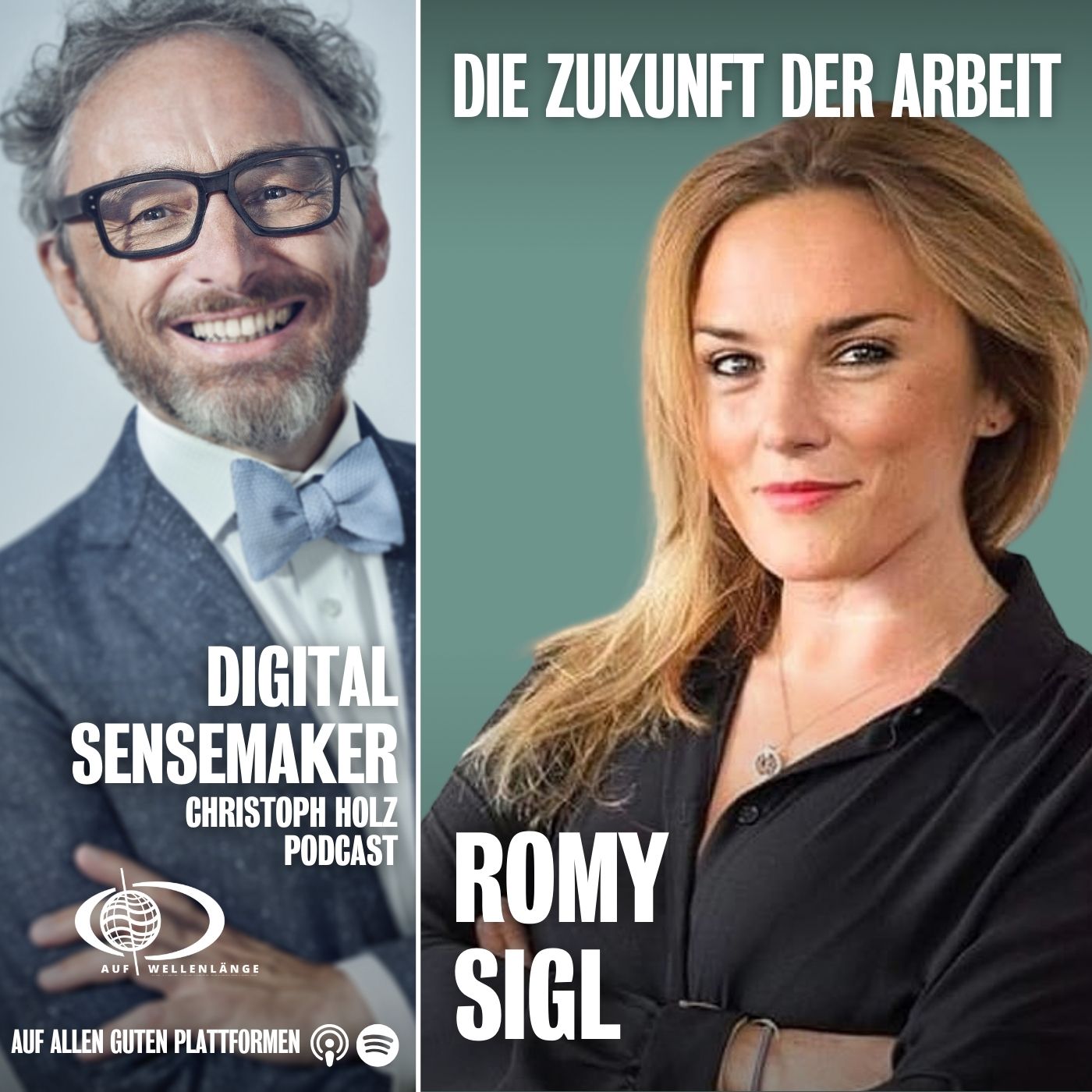
Gedankenspiele über die Zukunft der Arbeit: Isoliertes Arbeiten macht schon lange keine Freude mehr? Was, wenn Menschen, die nicht mehr allein über ihren kreativen Prozess grübeln wollen, einfach ihren Arbeitsplatz teilen? Der COWORKINGSALZBURG CLUB ist mehr als nur ein Arbeitsplatz. Er ist eine Community von ambitionierten Unternehmern, Kreativen und Innovatoren. Jedes Mitglied bereichert die Community mit einzigartiger Expertise und Perspektiven. Im Podcast "Digital Sensemaker" ist in dieser Folge Romy Sigl, die CoworkingSalzburg Gründerin zu Gast. Sie nennt sich "Do What You Love Seminarleiterin", ist New Work Expertin und globale Netzwerkerin. Als persönliche Schülerin des Urvaters von NEW WORK, Prof. Dr. Frithjof Bergmann, spricht Romy darüber, wie du dein Unternehmen von überholten Strukturen befreien und eine Kultur der Innovation schaffen kannst…
.jpg)
Wird die KI der Gott des dritten Jahrtausends? Claudia Paganini ist Expertin für Medienethik. Als Philosophin und Theologin forscht und lehrt Sie an der Universität Innsbruck. Mit Christoph Holz geht Sie in dieser Folge von "Digital Sensemaker" der Frage nach, ob Künstliche Intelligenz der neue Gott der Menschheit werden kann. Was sehen Menschen in der KI ? Gibt es Parallelen zum religiösen sprechen? Gibt es Parallelen dazu, was Menschen sich vom Gottesglauben erwarten? Erfüllt KI Aufgaben, die wir eigentlich nur Gott zusprechen? In diesem Podcast geht es um die wichtigste Wertedebatte in Sachen Künstlicher Intelligenz. Und am Ende darum, ob der Mensch gerade selbst abgeschafft wird…
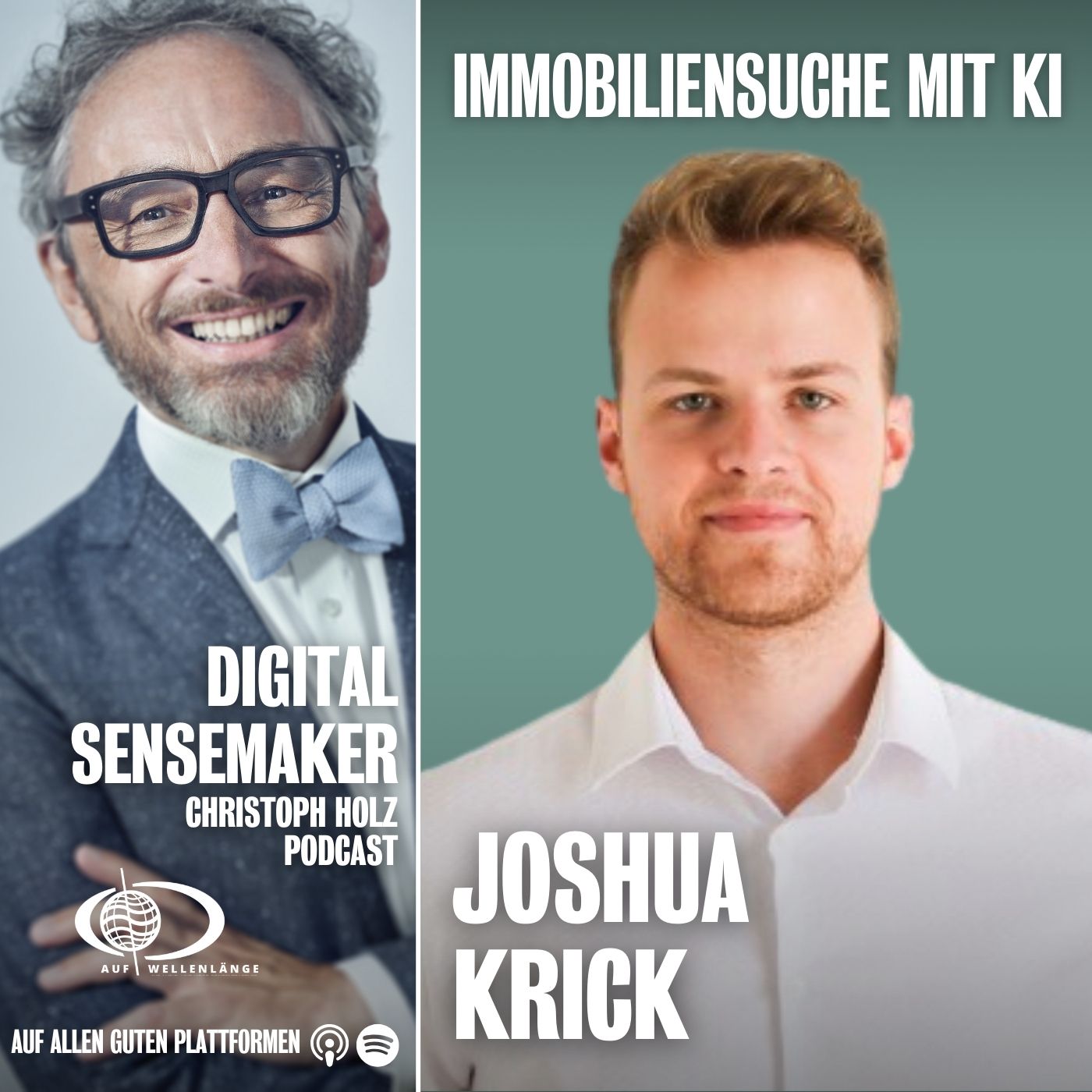
Künstliche Intelligenz kann die Immobiliensuche revolutionieren! In dieser Episode des Podcasts „Digital Sense Maker“ diskutiert Christoph Holz mit Joshua Crick, CEO von SearchPlace.ai. , die Chancen im Immobilienmarkt durch den Einsatz von Künstlicher Intelligenz. Wie wird KI den eher konservativ aufgestellten Immo-Markt verändern? Ist bald Schluss mit der nervigen Immobiliensuche auf zig verschiedenen Plattformen und Anbietern? Was ist die Alternative zur klassischen Filtermethode ? Joshua Crick stellt uns die KI-Immobiliensuche „Search Place“ vor, die eine vereinfachte und umfassende Suche nach Immobilien ermöglichen soll. Erst in Österreich, dann in Deutschland, dem DACH -Raum und bald weltweit…
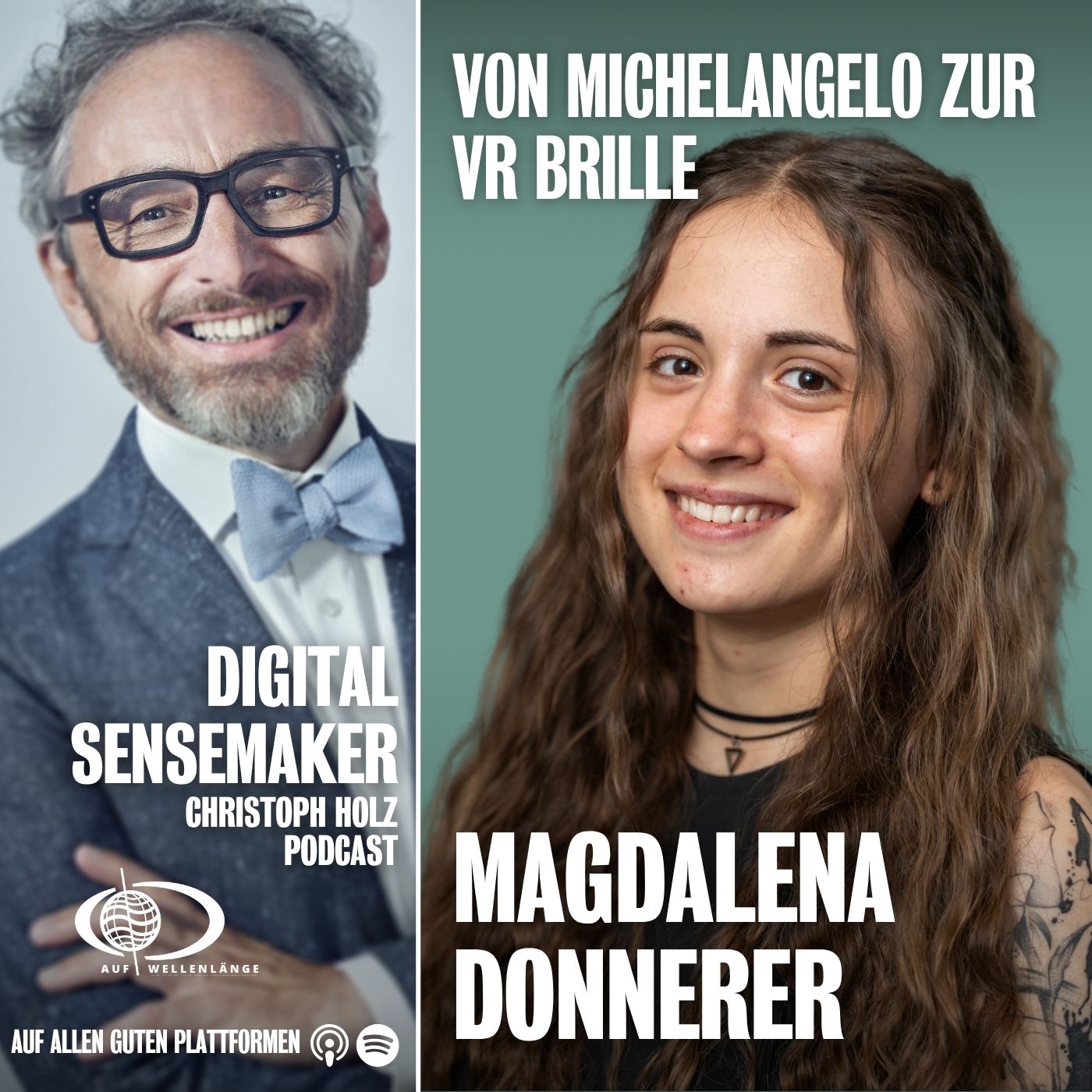
In dieser Episode des Podcasts „Digital Sense Maker“ spricht Christoph Holz mit der Künstlerin Magdalena Donnerer über die Evolution der Wandmalerei und den Einfluss der Digitalisierung auf die Kunst: Von Michelangelo bis zur VR Brille! Magdalena erklärt, wie sie mit VR-Technologie arbeitet, um ihre Wandmalereien effizienter zu gestalten und die Herausforderungen, die damit verbunden sind. Sie diskutieren die Zukunft der digitalen Kunst, die Rolle von Social Media und die Professionalisierung von Künstlern in der heutigen Zeit.
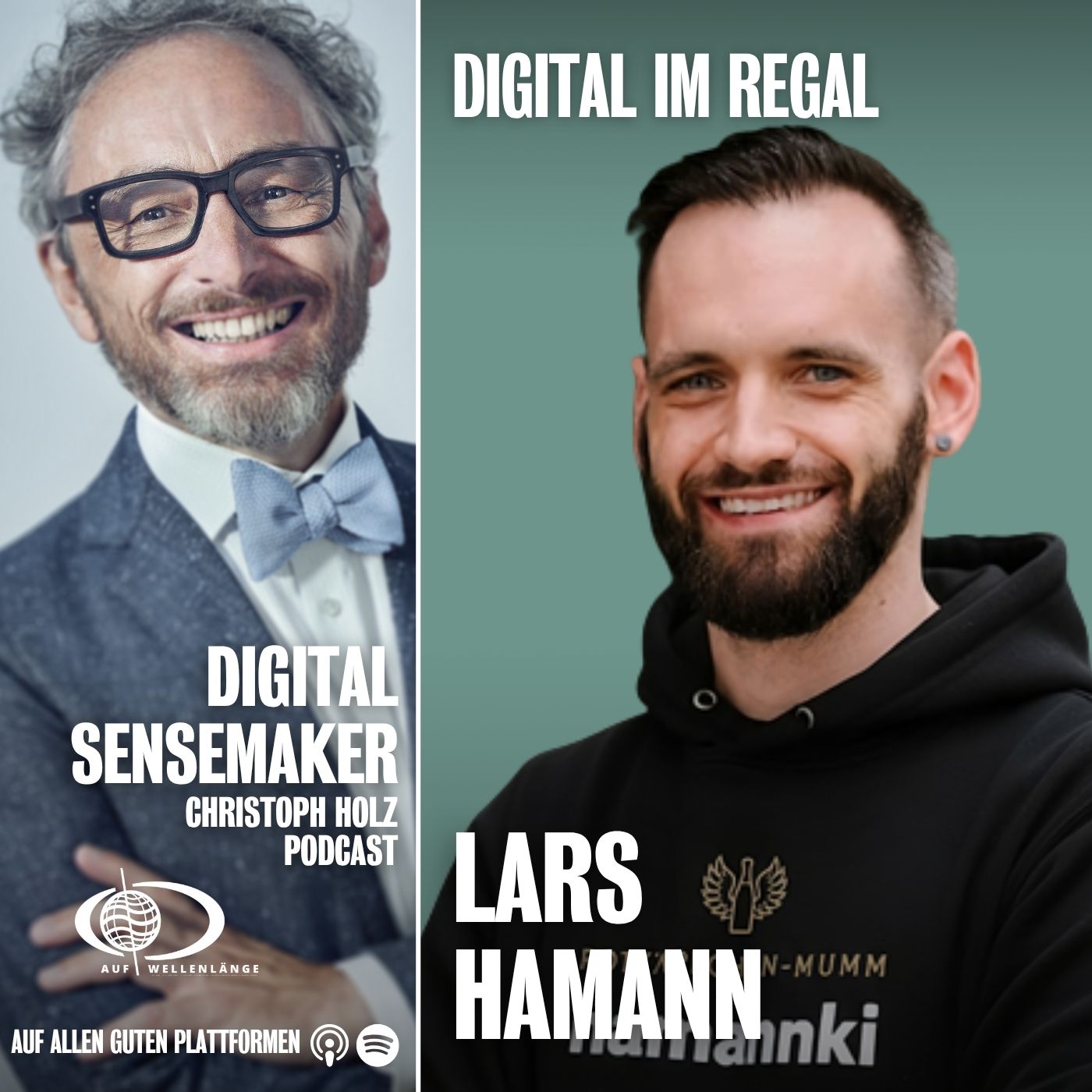
In diesem Podcast diskutieren Christoph Holz und Lars Hamann über die Herausforderungen und Chancen der Digitalisierung im Getränkebereich, insbesondere durch den Einsatz von Künstlicher Intelligenz. Lars, Head of Digital Business Sales bei der Rotkäppchen Mumm Group, erklärt, wie KI zur Optimierung der Regalplatzierung und zur Verbesserung der Shopping-Erfahrung eingesetzt wird. Sie beleuchten die Schwierigkeiten der Digitalisierung in Deutschland, die Bedeutung von Veränderungsmanagement und die Notwendigkeit, Mitarbeiter in den Prozess einzubeziehen.
.jpg)
In diesem Gespräch zwischen Catharina Rieder und Christoph Holz werden zentrale Themen der Digitalisierung, Künstlichen Intelligenz und deren Einfluss auf menschliche Beziehungen und Erziehung behandelt. Genauer gesagt, um "Networking". "Gerade in Zeiten von Digitalisierung, Social Distancing und Wisch-und-Weg-Mentalität werden persönliche Beziehungen und professionelle Netzwerke für beruflichen Erfolg immer wichtiger", sagt Catharina. Wie können wir die die menschliche Kommunikation fördern und gleichzeitig die Vorteile der Technologie nutzen?
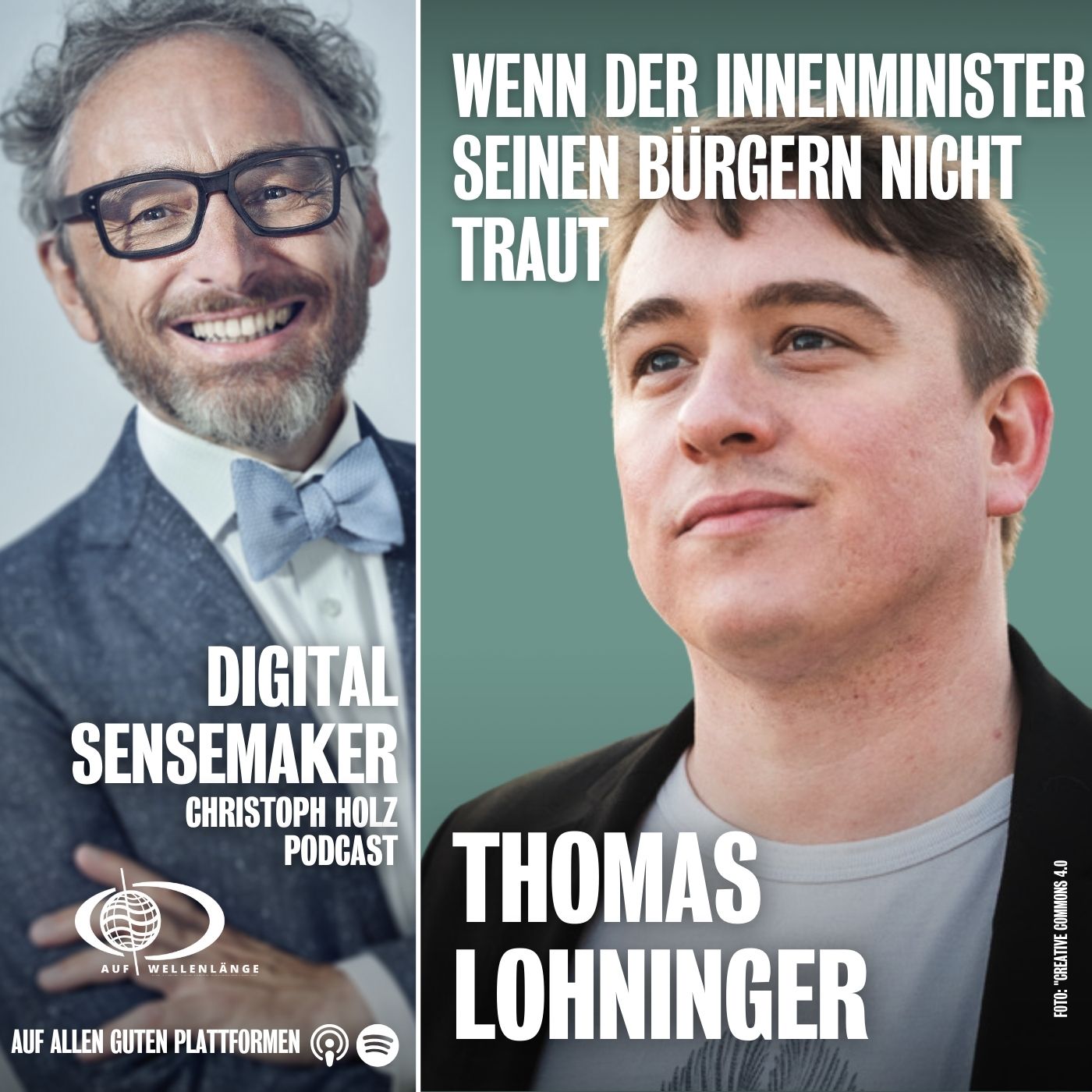
Datenschutz ist Brandschutz für die Demokratie"! Das sagt Thomas Lohninger, Gast dieser Folge von Digital Sensemaker. Im Podcast über den Sinn und den Unsinn der Digitalisierung geht es diesmal also um die Folgen von digitaler Überwachung. Geheimdienste stecken Milliarden in die Überprüfung des Internet, um Anschläge zu verhindern. Aber wie wir wissen, funktioniert das nicht wirklich. Was steckt also dann dahinter? Thomas Lohninger ist Kultur-und Sozialanthropologe. Er ist Geschäftsführer von epicenter.works, der Plattform Grundrechtspolitik, und hat die digitale Zukunft Österreichs massgeblich mit gestaltet. Thomas ist ein Vorreiter für digitale Grundrechte. Nicht nur in Österreich.
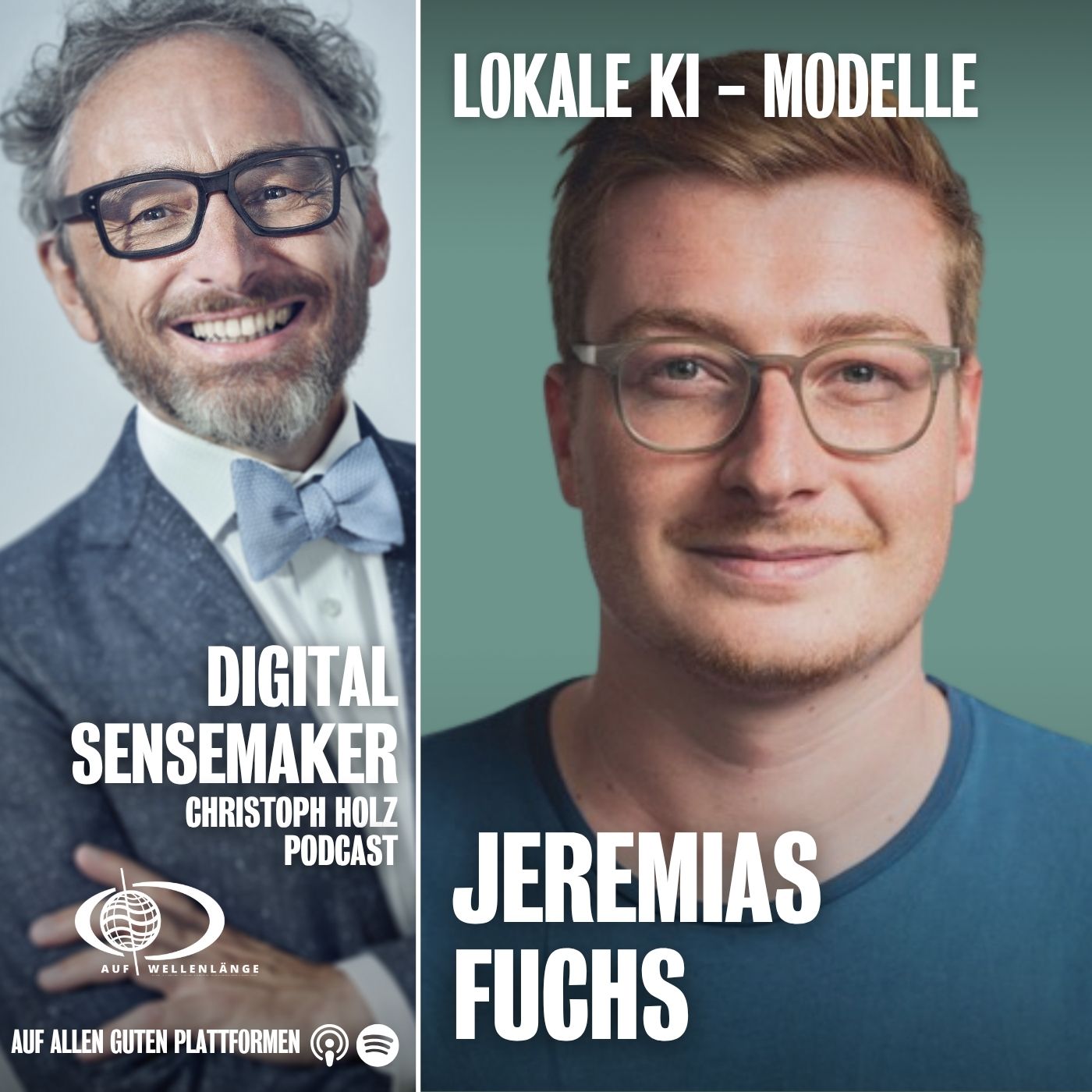
Jeremias "Jerry" Fuchs setzt als CEO von "LocalMind" auf lokale und sichere KI-Plattformen für Unternehmen. Sein Credo ist europäisch. Im Focus: maximale Datensicherheit, volle Kontrolle und Unabhängigkeit von der Cloud. Wie das funktioniert und was die Herausforderungen der Zukunft im Hinblick auf eine verantwortungsvolle Nutzung von KI sind, gibt es in dieser Folge von Digital Sensemaker zu hören!
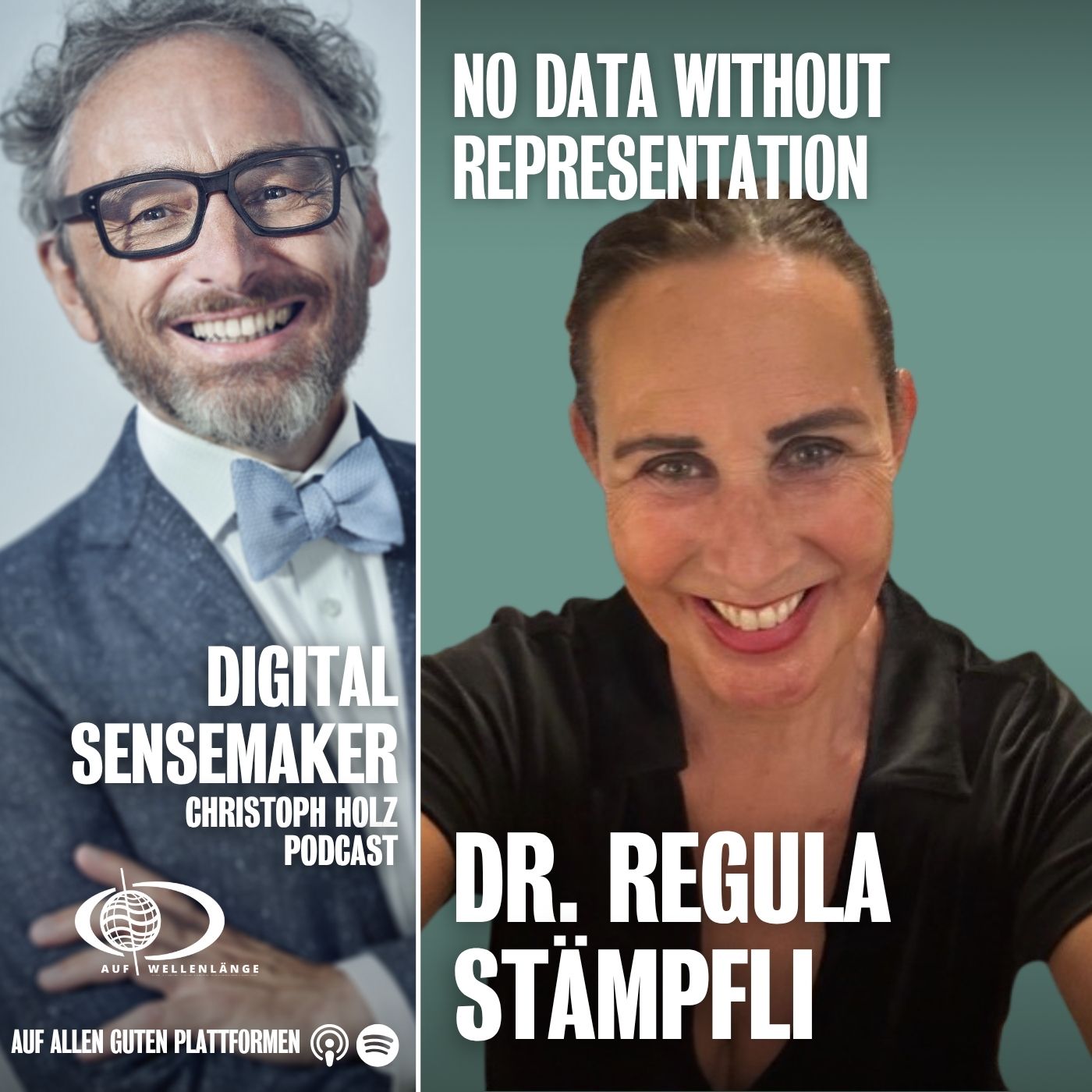
No Data without Representation. Oder: Die Demokratisierung der Digitalisierung In dieser Episode des Podcasts "Digital Sensemaker" diskutieren Christoph Holz und Dr. Regula Stämpfli die komplexen Beziehungen zwischen Demokratie und Digitalisierung. Regulas Thesen: "Nicht die Demokratie muss digitalisiert werden, sondern die Digitalisierung demokratisiert. Alle Menschen haben das Recht, gleich zu zählen – wie alle Menschen vor dem Gesetze gleich sind. Was im realen Leben verboten ist, darf auch digital nicht erlaubt sein. No Data without Representation. Wer nicht gezählt wird, verschwindet. Codes sind nie neutral, sondern die neuen Schriftsetzer eines digitalen Pharaonenreichs." Regula studierte Staats- und Verfassungsrecht und Geschichte an den Universitäten Bern, Zürich und Berlin; ihre Masterarbeit beschäftigte sich mit der diplomatischen Anerkennung Chinas im Kalten Krieg. Die Algorithmen-Expertin bei der Bertelsmann-Stiftung hat ihren PhD über Geopolitik und Gender 1914-1945 verfasst, erhielt den ersten Fakultätspreis der Universität, durchlief die akademische Karriere, machte sich in den Nullerjahren als Medienunternehmerin selbstständig. In dieser Funktion berät sie die EU, Organisationen & Verbände, gründete die öffentlichen #HannahArendtLectures an der HSG (die sie selber leitet), schreibt Leitartikel und Kolumnen für Medien im deutschsprachigen Raum und ist Verfasserin von neun Monographien im Sachbuchbereich. Ihr gehören drei Podcasts als Co-Host Die Podcastin, ArtisapieceofCake.Art und der Futurepodcast.
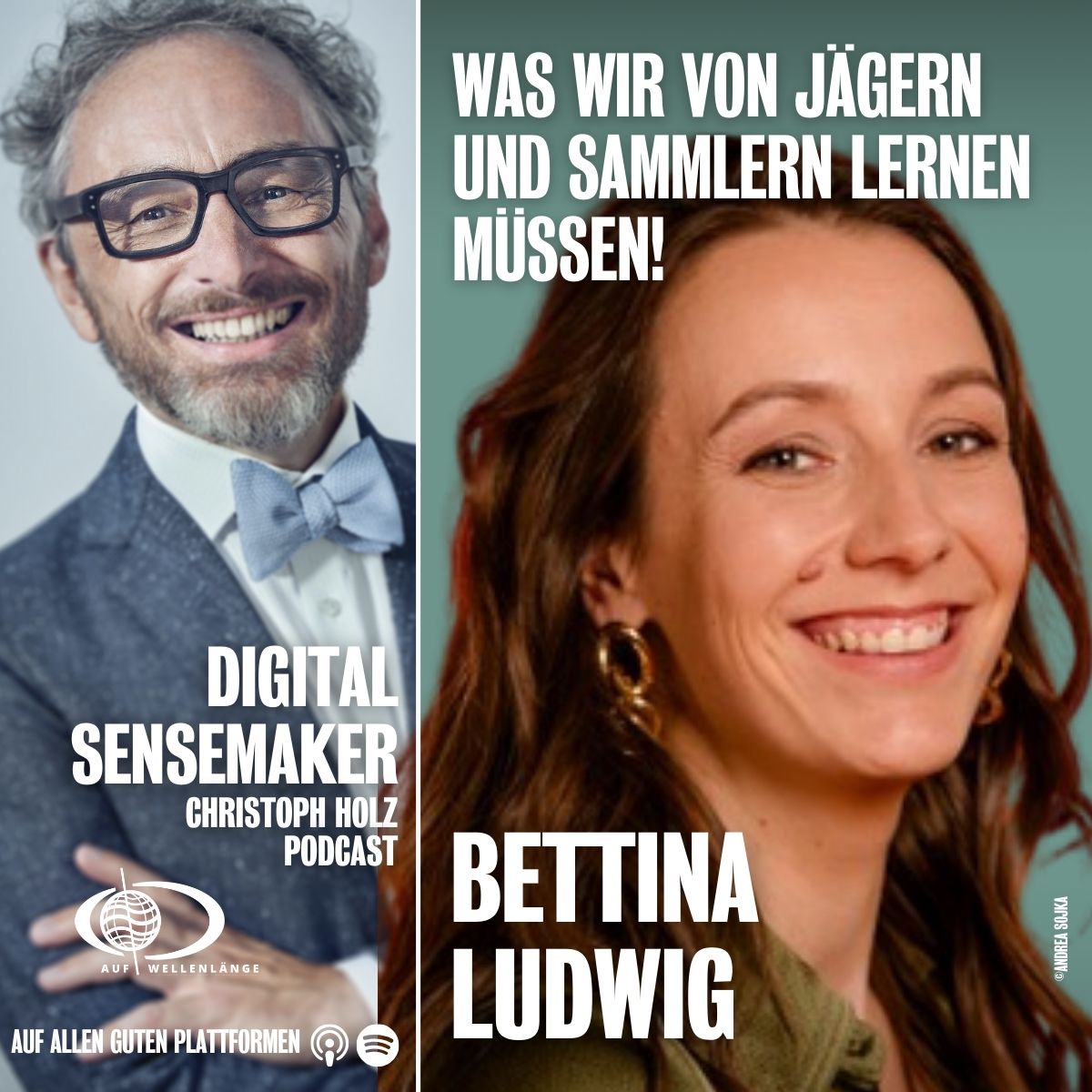
Bettina Ludwig ist Kulturanthropologin. Sie beschäftigt sich also mit der Erforschung von menschlicher Kultur und deren Entwicklung. Sie untersucht, wie Menschen in verschiedenen Gesellschaften denken, fühlen und handeln und wie sich diese Muster im Laufe der Zeit verändern. In dieser Folge berichtet Sie uns über Forschung zu Jäger- und Sammlergesellschaften beleuchtet. Wie sind diese Gesellschaften heute organisiert? Welche Rolle spielen dort Gemeinschaft und Zugehörigkeit? Gibt es Glück und Armut in den Jäger und Sammler-Kulturen? Sie spricht darüber, was wir in der "westlichen" Welt von ihnen lernen sollten!

Digitalization in sports! "Switch5" prevents what none of us want: being selected last or last for a team. That's not motivating. It's not fun. Valentin Schwaiger and his teammates have therefore launched an app for this purpose. For team sports in clubs or schools. The idea: Teams within the team are automatically formed, and players can switch teams multiple times during the game. This ensures fair competition and allows every player to interact with different teammates and opponents. "The concept creates action, competition, and fun on the field!" says Valentin.

Simulation and practice: In this episode, Boris Polenske and Christoph Holz talk about the future of driving schools and their lessons. Driving simulators must help the driving school industry, which is stuck in analog, out of potential decline. What do autonomous and electric vehicles mean for the industry? Boris and Christoph shed light on the challenges in the driving school industry, the need for digitalization and the impact of regulation on necessary innovation.

Practical application of prompt engineering In this episode of the "Digital Sensemaker" podcast, Christoph Holz talks to Dr. Andreas Kohne about the importance of prompt engineering in the use of language models such as ChatGPT. They discuss how to get better answers by asking precise questions and the differences between different AI models, especially in terms of research and text generation. They also discuss the future of Google in the context of emerging LLMs and AI agents. This podcast discusses the future of artificial intelligence (AI) and its impact on business models, advertising and marketing. The panelists highlight the challenges associated with the unreliability of AI systems, particularly in relation to hallucination and bias. The role of society in dealing with AI technologies will also be discussed, addressing both opportunities and risks. Our guest Dr. Andreas Kohne is a top speaker. He teaches at various universities and has published several books with Springer-Verlag

In this episode of the "Digital Sensemaker" podcast, Christoph Holz and Thomas Zwachte talk about the challenges and opportunities of digitalization, particularly in the context of artificial intelligence (AI) and blockchain technology. Among other things, they shed light on the importance of trust in digital systems and the need to guarantee the authenticity of information. Blockchain technology is presented as a potential solution for ensuring digital authenticity and trust in information.

In this episode of the "Digital Sense Maker" podcast, Christoph Holz and Simon Winhart discuss the challenges and opportunities of digitalization in schools. They highlight the changes in technology, the role of teachers, the differences between digital and traditional teaching tools and the need for a better infrastructure for digital education. They also emphasize the need for effective digital school management to make teachers' work easier and provide students with an optimal learning environment.

In this podcast, Christoph Holz and Sophie Hundertmark discuss the challenges and opportunities of generative AI in companies. They shed light on topics such as data protection, the use of custom GPTs, the need for employee training and the ethical considerations associated with the use of AI. The potential changes to company structures through the use of AI will also be discussed.

In this episode of the "Digital Sense Maker" podcast, Christoph Holz and lawyer Dr. Lukas Staffler discuss the challenges and opportunities of digitalization in the context of legislation, in particular the European Union's AI Act. They shed light on the differences between European and American law, the legal uncertainty for companies, the power asymmetry in high-risk applications and the challenges for small companies.
.jpg)
In this episode of the podcast "Digital Sense Maker" Christoph Holz and Maik Meid discuss the challenges and strategies in fundraising for NGOs (Non governmental organizations) in Germany. Maik talks about the importance of digitalization and the need for individual approaches in fundraising: Why do German NGOs have difficulties in implementing digitalization? Does AI play a role at all?
.jpg)
Christoph Holz met up in Silicon Valley for an autonomous excursion. In a self-driving car. His passenger is Dr. Mario Herger. He has lived in Silicon Valley since 2001. He researches technology trends there, writes books on the subject and advises companies on topics such as innovation, Silicon Valley mindset, foresight mindset, automotive, artificial intelligence, creativity and intrapreneurship. A conversation about autonomous driving, robot drivers and why there is still resistance, among other things.
.jpg)
AI and school: Without digitalization we endanger democracy AI and school part 2: This time it's about the use of AI in schools and how learning is changing as a result. The guest is Gert Mengel, principal of Don Bosco Schule RostockPodcaster. The podcast is about analog learning and longing spaces, the role of teachers, the importance of learning together, and the very different roles of TikTok and YouTube. Media skills are needed in our schools. Because: "Without digitalization, we endanger democracy," says Gert Mengel. An outlook on the future of schools and the need for a critical approach to the digital world.

In this episode of the Digital Sense Maker podcast, Christoph Holz talks to Mojmir Horvath, Paul Wenth and Richard Senger. They are students at the HTL Spengergasse in Vienna. They are part of the gifted and talented program there and have discovered their passion for computer science. They not only value the education on offer at their school, but also the opportunity to take part in projects in the "free economy" at a young age. The students talk about the challenges of AI development, the need for programmers in the future and their own plans for the future.

Why human relationships are becoming increasingly important In this episode of the Digital Sensemaker podcast, Christoph Holz and Astrid Brüggemann discuss the impact of artificial intelligence (AI) on work. Will ChatGPT 4 put all copywriters out of work? Astrid doesn't think so. But change must be shaped. Musings on the special role of "the Germans". Why human relationships are becoming more important and why we can learn new skills through AI. And along the way, Astrid Brüggemann offers tips on prompting from her bag of tricks.
.jpg)
Insights into the world of work at Google! In this episode, Christoph Holz talks to Laura Henke about innovation culture and employer attractiveness using Google as an example: How do companies like Google enable innovation? What role does psychological safety play in this? About a culture of innovation that promotes thinking in terms of big visions, but also gives enough room for fun and games.

Musings on the dark side of digitalization: Christoph Holz reports on a case in which a young man was the victim of blackmail and cyberbullying and ultimately took his own life. This raises the question of who is to blame and how such tragic events can be prevented.
.jpg)
Spotify, Amazon, Weezer etc. have been criticized for a long time. It's about the unequal distribution of income for the artists*. The gap is widening: the few superstars are making a name for themselves at the expense of the "little ones". Markus Hahn wants to change this with his start-up " fjalla ". His vision is to "free female musicians and independent artists from the traditional constraints of the music industry" by reaching their fans directly, without the intervention of middlemen such as Spotify and CO.

Software is there to make the world a better place. But its development is ultra-complex. Do you build it? Do you buy it? Do you have it built? In this episode of the Digital Sense Maker Podcast, Christoph Holz and Simon Jiménez discuss the paradox of software development and the challenges of requirements engineering. In German: The requirements analysis. In other words, how do you find out what steakholders really need? And do they even know what they need?
.jpg)
This podcast is about investing. "In times of crisis, equity creates crisis resilience," says Daniel Horak. He is co-founder of the crowdinvesting platform CONDA. The mission is to enable crowdinvesting for start-ups and small and medium-sized enterprises.

This episode is about the future of digital leadership and what we can learn from the social structures of the Apaches, Aztecs and modern clan-led pseudo-democracies.
.jpg)
Josef "Sepp" Hochreiter is the inventor of Long Short-Term Memory (LSTM) and still has big plans. Only this time, they are to be implemented in Europe... At the moment, the AI models that have "eaten" the most data are the best. And they are American. How do we get away from this model? Will less data soon be more? We also need "European" data, says Sepp Hochreiter. How could that work?
.jpg)
This episode is all about money - and how to keep it under control. What are the psychological aspects of spending money? How do nudging and gamification help us to save consciously? Christoph Holz talks about this with Martin Granig, co-founder of the financial app "Monkee".

In this podcast, Christoph Holz lets us take part in his thought experiments. On an exciting course about loss of control, morality and the new source of truth. What does GPT training do with my data? Will ChatGPT become the largest library in the world? How does the "correctness control" of large language models affect our lives?

In this episode of the Digital Sense Maker podcast, Christoph Holz talks to Oliver Wimmer, CEO and co-founder of Herzensapp, about solutions to the shortage of specialists in the medical and social sectors. They discuss the role of documentation in care and how AI technologies can make documentation work easier. They also talk about Herzensapp's Family App, which enables transparency and communication between caregivers, patients and family members. Oliver emphasizes the importance of trust and integration in care.
.jpg)
Jenny Danhausen is a musician and music teacher. She teaches her international students - whether singing, guitar or piano - exclusively via video link. What are the advantages and disadvantages of this method? How does she convey empathy and a personal connection, without which music would not work? Jenny also spoke to Christoph about how you can earn money as a musician today, what Spotify contributes to artists' livelihoods and why Jenny is not (yet) afraid of AI.
.jpg)
Today I'm talking to Patrick Prior about the use of artificial intelligence (AI) in the justice system. We discuss the role of AI in adjudication and the challenges associated with it. In addition, specific examples of the current use of AI in the justice system are given. The episode ends with a look at the connection between law and computer science. We talk about how prompting, i.e. the correct use of AI systems, can improve legal work. The risks of using AI in legal work are also discussed, in particular the risk of incorrect output from AI systems.
.jpg)
In this podcast, I talk to Prof. Dr. Ing. Roman Dumitrescu about the use of generative AI in production. Among other things, we talk about the characteristics of digitization, creative solutions with Lego and ChatGPT, the generation of test cases and the use of ChatGPT for CAD drawings. How generative AI is changing production. Finally, we talk about the fear of generative AI and the protection of privacy. We talk about fears and acceptance of AI, the impact on jobs and the shortage of skilled workers. What potential does AI offer in the world of work? We conclude with an outlook on the future of manufacturing and the attractiveness of careers in this field.
.jpg)
In this episode, Christoph Holz and Fabian Westerheide shed light on digitalization and the influence of artificial intelligence (AI). They discuss the definition and development of AI as well as the challenges of identifying promising AI start-ups. Fabian shares his experience as an AI investor and emphasizes the importance of digitalization in Germany. They also discuss Germany's path to becoming an AI nation and the role of the state in promoting AI. Finally, they give practical tips on how to improve your own AI skills and promote digitalization.
.jpg)
Today, the focus is on the digital challenges and solutions in industrial logistics. My guest Dr. Corinna Engelhardt-Nowitzki explains the importance of the fish toad diagram as an analysis tool and discusses the complexity of logistics. It also explains how delays and congestion arise and how flexibility and speed can be achieved in logistics. At its core, it is about the effects of AI, dependence on global supply chains and the pursuit of resilience. We address the relationship between efficiency and flexibility, the transformative power of digitalization, the connection between biology and technology, and the complexity of AI, and underline the relevance of human skills and ethical responsibility.
.jpg)
Are websites energy guzzlers and how does the energy consumption of 5G compare to 4G? The rebound effect, in which an increase in efficiency leads to increased consumption, is also discussed in today's podcast episode. We also talk about the environmental impact of artificial intelligence and the energy consumption of search engines. It is about the impact of technology on the environment and the possibilities of finding more sustainable solutions. The social and ethical issues surrounding supply chains and resources will also be addressed. Every individual can make a contribution to saving energy by acting consciously.
.jpg)
Artificial intelligence in financial analysis, sustainable investing, ethical aspects of digitalization, the future of the financial sector. I talk about all these topics with my guest today, Katharina Herzog. With Katharina, I discuss the role of AI in the financial world and its influence on the analysis of company data. Katharina shares insights into the challenges and potential of sustainable investing and how money:care is helping to transform this area.
.jpg)
Today it's back to ethical aspects of digitalization. I'm shedding light on the tension between profit and ethics with my guest today, Benjamin Lange. Benjamin introduces us to moral philosophy and looks at alternative moral approaches. We discuss the role of ethics in companies and the benefits of ethics consulting for ethical decision-making, especially in the context of technology and AI. The conversation links computer science with philosophy, with Benjamin emphasizing the importance of analytic philosophy and formal logic for computer scientists. Finally, we discuss the importance of AI assurance through external evaluations and give an outlook on Benjamin's future research.
.jpg)
With my guest today, I discuss the formalization and codification of digital ethics and its limits. We talk about the need for ethics boards and ethical evaluations in medicine. The ethical principles in medicine are presented and discussed how they can be transferred to digitalization. The challenges of regulating digitalization and the speed of digital transformation will also be addressed. It is important to note that trust in technology and the creation of trust through ethical regulations are of great importance. Merck has developed its own "Code of Digital Ethics" and works with external ethicists to analyze challenges and make recommendations. Ethics are seen as flexible principles. Jean Enno emphasizes the importance of ethical principles in the corporate culture.
.jpg)
What is swarm intelligence and what does it have to do with artificial intelligence? I talk about this with my guest today, Melanie Schranz. In so-called swarm models, the swarm consists of many individual, simple and relatively homogeneous agents. With their main advantages: Adaptability, robustness and scalability, swarm intelligence can solve complex tasks. Look forward to an exciting discussion!
.jpg)
Use of AI in education and exams, text modification through ChatGPT. In this podcast, we discuss the use of artificial intelligence (AI) in teaching and exams at universities. We explain how AI systems such as ChatGPT are changing the way texts and theses are written. We emphasize the democratizing effect of AI on text quality and individual support. The role of AI in opinion formation and the challenges of regulation and censorship of AI systems will also be addressed. Finally, we discuss the social changes brought about by artificial intelligence and possible digital unemployment. Patrick emphasizes that knowledge workers in particular are affected by AI and that it is important to get involved at an early stage and use the tools sensibly.
.jpg)
With my guest today, Rieke C. Harmsen, I talk about the complex world of journalism in the age of digitalization. We shed light on how truth and objectivity are being shaped in the media and what role artificial intelligence plays in this. The main topics are: Journalism and objectivity, AI in journalism, Ethics in technology, Social impact of digitalization, Transparency and participation and the role of journalism.
.jpg)
Today, the focus is on the role of AI in the advertising industry, the limits of its use in personal services and the future integration of AI in society. In particular, the importance of the human element in the service sector is emphasized despite technological advances. We also reflect on the evolution of AI compared to the introduction of the internet and discuss privacy concerns when using AI in companies. Finally, we emphasize the irreplaceability of human uniqueness and the importance of responsible use of technology.
.jpg)
Is artificial intelligence a psychopath and analyzes us based on imperceptible clues? In other words, can it read us humans? A tense hand, a small twitch in the face or the raising of a corner of the mouth reveal a lot about what the other person is thinking and feeling. Just like in the TV series "Lie to Me". An AI can simulate emotions - pretend. But just like psychopaths, an AI cannot feel emotions. But that doesn't matter, because our feelings are real. Today I'm talking to Sabrina Rizzo about this area of tension.
.jpg)
In the modern business world, meetings are an unavoidable part of everyday work. Although they are often necessary to drive projects forward and make decisions, documenting these meetings can be a time-consuming task. Which brings us to the question: Can Artificial Intelligence (AI) write minutes? I talk to Christian Vancea about how AI is revolutionizing the efficiency of meetings and how powerful AI already is here.
.jpg)
In today's podcast episode, I discuss with Rebekka Gorges complex topics such as discrimination, prejudice and social power structures. Rebekka, who is involved in anti-discrimination work, talks about the deep-rooted prejudices and biases in our society and how these affect different groups, especially marginalized people such as black people, homosexuals and women. Overall, the episode offers deep insights into the complexities of power, identity and discrimination in modern society.
.jpg)
When everything inhuman has been digitized, what remains is the human being: perhaps creativity, empathy, responsibility or the empty crowd? Have we humans become reproducible through AI? What are the ethical aspects of current and expected developments in AI? What is our position in Europe and how do other parts of the world see it? Are there more opportunities or risks in these developments? My guest today is Prof. Dr. Stefan Heinemann and, as he says about himself, he is totally "AI-friendly". I talk to him about precisely these aspects.
.jpg)
There is currently a great deal of FOMO in legal departments and law firms as well as in the public sector with regard to AI - the fear of missing out. With the first Legal Tech Map AI/AI, Futere-Law provides a handy overview of AI & Legal Tech companies and their areas of application for lawyers in law firms, legal departments and the public sector. Since the groundbreaking launch of ChatGPT in 2022, we have seen an explosive development of large-scale AI models in the legal sector. Sophie Martinetz explains how important it is to approach the specific areas of application and possibilities of artificial intelligence with caution. The AI Map serves as a map for the first explorations of AI technology for lawyers in all areas.
.jpg)
In this podcast episode, we discuss the role of artificial intelligence (AI) in the future medical culture. We look at how AI could replace certain human skills in medicine, but without replacing humans themselves. The potentials and limitations of AI applications in medicine are considered, including the associated ethical and procedural challenges. It is emphasized that medicine, science, politics and industry must share responsibility for the design and use of medical AI. We also discuss how AI can improve the quality of medical care and make medicine more human by enabling physicians to focus more on the human aspect of patient care.
.jpg)
Which 3 factors are decisive for the success of AI integration in companies? That's what I'm talking about today with Katharina Mager-Micijevic. We talk about the importance of artificial intelligence (AI) in our society and how it influences our everyday lives. Katharina emphasizes how important it is to overcome fears and prejudices about AI and to have an open dialogue. AI should not just be seen as a tool, but as a partner in solving problems. Katharina shares her experiences of how she and her agency support a wide range of companies in using AI effectively. The focus is on how AI can be used to open up new perspectives and create added value in society.
.jpg)
In this episode, I discuss with Stefan Tewes the profound changes that digitalization is bringing about in our society, economy and working world. We look at how modern leaders need to evolve from subject matter experts to true people leaders and the importance of individual identity in a digitalized world. The digital revolution is seen as a transformation towards more human labor and the need for a global perspective on the skills shortage is highlighted. This episode offers deep insights into the challenges and opportunities that the digital era holds for us all.
.jpg)
Background and analysis on the current topic at the world's most important startup: This exciting podcast episode is about the turmoil at OpenAI, the dismissal of Sam Altman and the resulting impact on the organization. It questions the professionalism and decision-making within the company and discusses the role of investors and the future of AI developments such as GPT-4 and GPT-5.
.jpg)
In today's episode, we dive into the dynamics of digital transformation. We highlight Germany's journey from Industry 4.0 to AI dominance and discuss how SMEs and manufacturing strength are influencing technology supremacy. Find out how a traditional construction company is transforming itself into an IT innovation leader and why "German data obsession" is slowing down AI development. Find out how precise funding applications and strategic ecosystem thinking are driving research and business models forward. Put on your headphones and let's go!
.jpg)
In our latest episode, we look at how digitalization is overcoming social barriers. The app "matches" older people with "time-spenders"; volunteers who spend time with seniors. This podcast is a call to action, showing the power of networking and how each of us can help shape society. Tune in for a dose of inspiration and the impetus to take action yourself!
.jpg)
In this episode, I talk in depth with Niko Kaindl about the recent conflict between Israel and Hamas. We take a look at the deployment of the Iron Dome defense system and its impact on security in the region. Of particular interest is the perspective of Niko Kaindl, who lives in Israel and shares his personal experiences and assessments of the events. We learn firsthand how people in the region are experiencing the conflict. We also shed light on the possible use of digital weapons systems and the role of surveillance technologies in this conflict.
.jpg)
Today we explore digitization and its multi-layered impact on our lives. Digitalization is deterministic, but its consequences are unpredictable. Our society is like a house under construction, where we often want changes after the fact. Digitization enables us to create a network of interconnectedness and knowledge discovery where we can distinguish between the ephemeral and the relevant. In this episode, we've emphasized the fascinating, deterministic nature of digitization and highlighted its uncertain future. Stay tuned for more discussions on this important topic in our ever-changing world.
.jpg)
"How can we live, work and come together better and happier as a digital society?": Since 2016, Iliana has been actively engaged in answering this question in practice. Quiet Social Club translates scientific findings from psychology, neuroscience, and behavioral science into everyday life in the form of workshops, self-coaching tools, products, and events. The growing global community consists of individuals, educational institutions, startups, academics, coaches, and nonprofit organizations. Iliana also supports a number of non-profit organizations and initiatives such as the Responsible Technology Hub at the Technical University of Munich as a consultant.
.jpg)
In this episode, we dive deep into digitalization policy with Jürgen Geuter: Discussing the role of blockchain and AI in democracy and how these technologies can influence society and politics. The call for more participation and diversity in political decision-making processes becomes clear. We discuss the relationship between fear, populism, and social conflict. We also explore the contradiction between efficiency and democratic processes. We both feel strongly about emphasizing the importance of values and trade-offs, especially in the use of technology.
.jpg)
Technologies in image recognition and description have made tremendous strides. My guest today, Jennifer Simonjan, explains how Artificial Intelligence (AI) can be used to automatically tag and describe images. A special focus is on image accessibility. Starting in 2025, a law is expected to require that images have a description so that they are accessible to the visually impaired. The conversation highlights the possibilities and ethical considerations behind these technologies.
.jpg)
How are big language models like GPT revolutionizing the attention economy and what role does Transformer technology play in this? Together with Jens Dorn, we shed light on how these technologies are transforming e-commerce and even medical research, especially in protein folding. But amidst all the technology, we also emphasize the invaluable importance of human relationships in the business environment. Join us on this exciting journey where AI and humanity go hand-in-hand to shape the future of business intelligence. A must-attend event for anyone interested in the intersection of technology and business success!
.jpg)
In this exciting podcast episode, I discuss with Karine Sargsyan and Tamás Landesz their new book "Future Intelligence" with an outlook on the world in 2050 - governments, innovators and companies enabling a better future. The book emphasizes that empathy, mindfulness, presence and sharing become the anchors for future decisions in 2050. This book is of general interest to anyone who wants to understand the future of the world, and is especially useful for planners, policymakers, strategists, and entrepreneurs.
.jpg)
The topics of knowledge, truth, lies and fake news are the theme of today's episode. The Internet, social media and artificial intelligence have increased the spread of extremist views. My guest today, Prof. Dr. Rainer Nawrocki, is a professor at Westfälische Hochschule, and says that Fake News is not a new phenomenon, as even animals use deception. I discuss the concept of Fake News and how it can be accepted in certain communities for group identification with him today.
.jpg)
Can our network-like thinking be translated into linear language, and how do models like ChatGPT reflect our knowledge of the world? Can an AI ever "feel" or develop real consciousness? And how is technology changing the way students learn and how media content is created? We also discuss whether AI could distort our perception of reality and what that means for our society. This episode is a must-see for anyone interested in the intersection of technology, ethics, and human thought. Whether you're a tech enthusiast, a skeptic, or just curious, this discussion will get you thinking. So, headphones on and let's go!
.jpg)
AI is considered the current driver of digitalization. With Anne Goldmann, political scientist and researcher at CAIS (Center for Advanced Internet Studies) in the research program "Digital Democratic Innovations", I talk about the role of politics in the age of artificial intelligence (AI). We talk about the influence of social media platforms like Facebook, Instagram and Twitter on the spread of lies and hate through AI. Should Germany take a leading role in AI development? What potential and what government efforts are there to support this?
.jpg)
With my guest today, Vassilios Katsogridakis, I talk about ethics in artificial intelligence (AI). The enhanced capabilities of AI, especially with the unexpected development of ChatGPT, have raised ethical questions. What should be done with this technology? Vassili is involved in organizing the Digital Ethics Summit 2023, which brings together experts to discuss moral issues related to the future.
.jpg)
In this episode, I once again discuss digitization and its sense and nonsense, with a special focus on cybersecurity. My guest, Olaf Classen, an information security expert, emphasizes the importance of trust in the state and the risks that arise when that trust disappears. Together, we shed light on how society perceives the opportunities and threats of digitization and why media often only focus on the downsides, such as cyberattacks. An in-depth conversation about the digital landscape of our time.
.jpg)
Every year, around 57,000 people in Germany develop lung cancer. Not all cancers are the same. Therapies are getting better and more specialized. In our free society, the decision about therapy should not lie with the doctor alone; the doctor should provide advice. The final decision lies with the patient himself. But how are patients and their relatives supposed to understand this flood of information?
.jpg)
Truth is the invention of a liar. Angela Merkel once said: We have arrived in the post-factual age. The American EX-president, whose name I never want to mention again, talks about alternative facts. Our brain is not into truth, but into dopamine. So news and for every truth a thousand lies can be invented - lies have one advantage: they don't have to be true. I'm talking about fake news with my guest today.

With electricity, it still took decades for it to catch on. With email, it also took many years before everyone had one. The artificial intelligence ChatGPT took only a few months to arrive in the companies. Things are moving faster and faster, and that's not changing. Change in companies will never be as slow as it currently is. Meanwhile, change management processes are already being overtaken by the wave of innovation. What to do?
.jpg)
Sky DE is currently running the new series "Tender Hearts" with Heike Makatsch. It plays with the thought experiment that in the not too distant future it could be possible for sex robots to be constructed for women. With my guest today, I talk about "machine love".
.jpg)
A technology as incredibly powerful as ChatGPT should also be as transparent as possible about how it works, right? This knowledge is too important to leave to just a tiny group of people who set the rules and run tests to make sure those rules are followed. Today, I talk to Dorothée Töreki about the pros and cons of making LLMs open source.
.jpg)
"Cyberf*cked: How Women Are Threatened and Harassed on the Internet - and What We Can All Do About It" (Mario Herger) - Hate and offending on the Internet have been on my mind for a long time. My online experiences as a man are not at all comparable with those of women and other victims. I already had an inkling of this. Sexual harassment and hate speech is a sad normality online as well. Today we look at the disgusting reality of this phenomenon.
.jpg)
The fact that soccer is a real sport could be observed most recently during the World Cup. Soccer is also available as a computer game - from the comfort of your sofa. There are even competitions for computer games, so-called e-sports. It makes you wonder: Is this really sport? Can professionals make a living from it? I talk about this with Daniel Märkisch, my guest today.
.jpg)
Social distancing is probably the unword of the decade. I, on the other hand, enjoyed it. Who needs to shower when you can keep your distance. Magically, video conferencing caught on. Today, everyone is happy to be in touch again. Video conferencing is now lamented as no substitute for real encounters. But why actually? Are real meetings really a substitute for video conferences - and vice versa. And why not? Today we talk about the sister of Social Distancing: Namely Virtual Distancing with Tanja Dreßen.
.jpg)
In the late 2010s, the first digital war, cyberwar, allegedly took place. States use sabotage by hackers precisely when they do not want a war. There is no need for cyberwarfare during a war. Real weapons are much more reliable but more expensive. Unfortunately, this is exactly what we can see in Ukraine. What cyberwar is and whether it is more than just a marketing gimmick, that's what I'm talking about with my guest today.
.jpg)
Who wouldn't want to spend their twilight years at home? How can technology take the worry of emergencies away from relatives without restricting their privacy at the same time? ELLY is a clever digital care solution for precisely this area of conflict between relieving the burden on relatives and alerting them in the event of falls or tendencies to wander off.
.jpg)
You can't learn entrepreneurship from books or in school. Entrepreneurial success comes from entrepreneurial experience. But how do you gain this valuable experience without jeopardizing your economic existence? This is where the Changemaker program comes in. In this way, the young people themselves give impetus to a sustainable design of the future and become changemakers of our society. By implementing their projects, the young people also expand and deepen their own entrepreneurship skills and can thus gain valuable experience for the future. Today, I talk about this in more detail with Constantin Badawi.
.jpg)
Machine intelligence based on neural networks has puzzled us a bit lately. It looks quite as if these algorithms are intelligent. A pocket calculator for writing, so to speak. What if machines could not only solve problems, but also have consciousness, or is it already that far? Would what we do today then be machine torture? I talk to the author of "Machine Consciousness" Ralf Otte about the differences between human and machine consciousness.

Recently, reports of violence against climate activists have been increasing. This does not come as a surprise if one considers the developments of the last few months. The dynamics of escalation have already been apparent for some time, both in the social media and in the statements of some politicians. Here, opinions and moods are amplified and, in some cases, radicalized. This time I talk about this with Prof. Dr. Claudia Paganini (media ethicist) and Vincent Schäfer (climate activist).
.jpg)
Companies come and go. Nowhere faster than in IT. The pioneers of digitization were often surprised by new challengers. The Internet and the smartphone have reshuffled the cards again and again. In 2012, Google took the lead in IT. Microsoft was the world's most valuable company for many years, and Apple was far behind. Apple is now at the top. But Microsoft is back. And now it's getting really exciting. I talk about that and Women in Tech with my guest today, Anna Kopp.
.jpg)
"An efficient administration remains capable of working even in times of crisis and prepares itself in good time for the major challenges of the future," explains Nikolaus Hagl, my guest today. What does that mean and what advantages would the use of a digital administration bring?
.jpg)
Lagos in Nigeria is one of the most important startup hubs in sub-Saharan Africa, along with Nairobi, Kenya and South Africa. That's where the action is. And with my guest today and some colleagues, we already took a look at this together in Lagos in October 2021. We will review our experiences a little bit today.
.jpg)
Who has never been haunted by an online advertisement, even though they bought the product long ago? Advertising seduces us to buy - some call it manipulation. Is that immoral? I talk about consumer movement data with my guest today.
.jpg)
The artificial intelligence ChatGPT is causing a stir in Germany. With Holger Volland author of: "The Creative Power of Machines: Why Artificial Intelligences Determine What We Feel and Think Tomorrow," I talk today about our life in a distorted (digital) reality. Because our view of reality is filtered through search engines, Facebook or Tik-Tok by an artificial intelligence.
.jpg)
3D printers now also print cells and tumors on a chip! The advantage of 3D printed cells is that they are three-dimensional, animal-free and reproducible! This is possible in the 3D bioprinting lab in Innsbruck, and I talk about it in more detail with my two guests today.

Text to image generators are experiencing a real boom right now. How Midjourney, Dall-E and similar tools can be creatively integrated into the (architectural) design process and which techniques and methods can be used to convert 2-dimensional images into 3-dimensional ones, that's what I discuss today with Julian Höck.

With the car, we invented the accident. We can only think about the morality of the accident afterwards. Anything else would be hubris. Digitalization also has its accidents. It is developing more or less exponentially. Does ethics still make sense at all? Do we perhaps need agile ethics? That's what I'm talking about today with Cornelia Diethelm.

The robo-teacher knows millions of didactic concepts - and uses only the best. Every student gets exactly the right content and methods from the digital teacher according to his or her individual learning type - without losing the class community. Today I'm talking about digital learning with Tobias Röhl. He is a member of the EU's Expert Group on AI and Data in Education and is working on an ethical guide for the use of AI in schools.

The extraordinary human social system only works because we are sickly. If we did not care what others say and think about us, there would be no social cohesion, no cooperation. Without a group, without cooperation, we would simply starve. In the past, grievance was limited to the immediate environment, to one's own horde. Today, it spreads at the speed of light via the Internet. This phenomenon is also referred to as a form of digital violence.
.jpg)
In the old days, when the world was still manageable, everyone had a PC in the office. Now, when it crashes, hangs up or makes any other kind of fuss, the IT technician comes. Will he come to my home office? Is he going to drive around? That's chaos. This episode with Olaf Höhne, which was sponsored by Intel, is about the order Intel is putting in place to counter this chaos with the vPro platform.
.jpg)
E-scooters, e-bikes and the like - micromobility has undergone a minor revolution in recent years. But safety is not just about wearing a helmet. The little racers are fast and a real road user. However, if I want to turn or even brake hard, others recognize this only with great difficulty and often too late! A problem that is looking for a solution. I talk to my guest today, Ines Wöckl, about road safety in micromobility.
.jpg)
How can we take advantage of the historic opportunity to use digitization to expand (direct) democracy - also on a global scale? Democracy is not an end in itself - only people are. So every era needs a form of democracy that does justice to the dignity of its people. I discuss what democracy is good for with my guest today, Daniel Graf.
.jpg)
Humans are the only creatures that can imagine different futures. Trends - even megatrends - are over faster than they came. Scenarios project our preconceptions into the future. Utopias, promise an optimal future at the cost of untold sacrifices in the present. My guest today looks at our perspective on the future and why that sometimes blinds us.

How long can the opposition stand by and watch as the closing of ranks drives up the government's approval ratings? How do you make good decisions when every expert says something different? Is the current industrial form of democracy up to the digital age? Rudi Anschober was a provincial councilor in the Upper Austrian government for 17 years and was then appointed health minister in the Sebastian Kurz II government. And then came the pandemic.
.jpg)
What are the challenges and consequences of the digital transformation for the linguistic discipline and its communication? Accordingly, semantic-pragmatic, cognitive, interaction-oriented, methodological and ethical perspectives on language and communication in the Internet age and methods of knowledge transfer to society will be focused on.
.jpg)
Whether the Metaverse really exists as a would-be successor to Facebook, and what is the last thing the Metaverse needs to become a true non-territorial post-national state, is what I talk about with my guest today, Thomas Riedel.
.jpg)
Our Stone Age brain is not into truth, but into dopamine. There is no sensory organ for truth - only for news - compared to our own memory. Our brain is not made for the digital media world and yet it copes amazingly well with it. I discuss why this is so with my guest today.

Decide for yourself! An app for interactive audio plays: "I want to bring authors into the 21st century," Rose outlines his concept. Specifically, users of the platform can actively intervene in the course of history. To this end, questions are repeatedly asked at intervals of several minutes. Depending on which answer the users choose, the story continues accordingly.
















